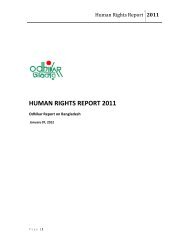Please - Odhikar
Please - Odhikar
Please - Odhikar
You also want an ePaper? Increase the reach of your titles
YUMPU automatically turns print PDFs into web optimized ePapers that Google loves.
� (b) The family, in particular dependants of persons who have died or become physically or<br />
mentally incapacitated as a result of such victimization.<br />
6. Victims should be informed of the availability of health and social services and other relevant<br />
assistance, and be readily afforded access to them.<br />
Hence, there is a need, in accordance with the principles developed by Indian Courts and<br />
international human rights bodies, for a national policy addressing all the issues relevant to the<br />
victim's interest for his/her monetary and psychological support.<br />
Justice Delayed is Justice Denied<br />
Mass Crimes in India : A Challenge to Our Democracy<br />
By Teesta Setalvad*, India<br />
Indian pluralism and diversity has thrived and survived despite the severe challenges of the<br />
past century. While these challenges have been of various kinds, economic, social and<br />
political, it is the response of our democratic system to these that will ultimately provide an<br />
accurate assessment of whether or not our institutions and wings of democracy are geared for the<br />
maximum good of the maximum number; of whether real democracy in any sense has evolved<br />
in India after we became independent; whether our Structures of Democracy and our Institutions<br />
have truly evolved structures and systems that address the needs of the Indian people. Electoral<br />
democracy we have but do we have democracy in the real sense? Have the structures and<br />
institutions of democracy been genuinely democratised?<br />
The pathetic and low rate of justice delivery in our criminal justice system is one area that has<br />
suffered from systemic and value based failure. While at many times of larger crises like<br />
communal or caste pogroms the judiciary is perceived as the last resort or final saviour, the huge<br />
backlog of cases that clog our courts and the utter failure of the judiciary to effect time bound<br />
trials (criminal trials could drag on 10 years and a civil suit to 25 years) has made a mockery of<br />
the justice delivery systems.<br />
Witness vulnerability and protection has become a live national issue once again with the<br />
unfortunate turnaround of Zahira Shaikh in the BEST bakery case. But if we rise above the<br />
personality and look at the issue, what does this once again tell us? The desire for justice and<br />
retribution, for a victim and eye witness to a ghastly and horrendous mass crime -where near<br />
and dear ones have been snatched away because of their community or caste-is and can remain<br />
strong if we have an effective justice delivery system, if the system aids and supplements every<br />
human beings desire to right wrongs that have been committed. But if the system makes a<br />
mockery of the tragedy, drags cases on (what has happened to the 1984 prosecutions is a case in<br />
point) can ordinary eyewitnesses and victims actually be expected to have the same zeal for right<br />
and retribution 10, 20 years on? They need emotional closure and need to move on. The system<br />
needs to radically reform itself so that we can proudly say that justice delivery and the rule of<br />
174<br />
Report 2005











